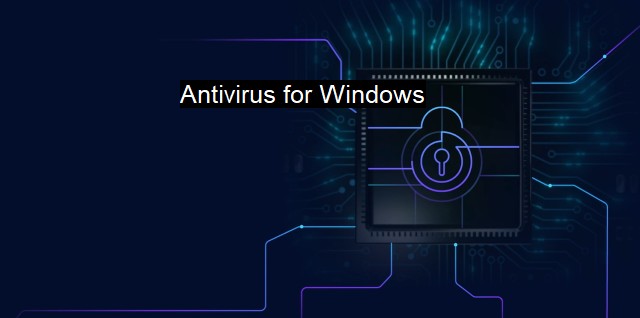What are Antivirus for Windows?
The Importance of Antivirus for Windows in Cybersecurity: Detection, Prevention, and Removal of Malicious Threats
Antivirus for Windows, as the name suggests, is a software developed specifically to identify, detect and remove various kinds of malware from Windows-based computers. This software aims at protecting Windows users from computing threats that victimize unsuspecting users with malicious intent. These threats can come in forms such as viruses, trojan horses, worms, spyware, adware, ransomware, keyloggers, sadly the list goes on.Primarily, an antivirus for Windows equips computers and other devices with relevant defensive measures to keep malicious software threats and advanced persistent threats at bay. It offers a safer use of technology by detecting unwelcome intrusions in real-time and the utmost security maintenance by providing regular database updates to tackle new and evolving cyber threats.
Antivirus for Windows ensures the health of your system by scanning files, programs, and applications systematically. When an antivirus program faces questionable content, it follows a set procedure to deal with it. It quarantines the suspicious entities, cutting them off from the rest of the files in your system, and deals with them accordingly - either through cleaning or deleting the files altogether. This mechanism helps to ensure the safety of the device from increasingly accelerating threats and security breaches.
These protective mechanisms are bolstered with firewalls, data backup options, email protection modules, scheduled scans, protection from phishing attacks, which collectively sum up as cybersecurity solutions. Infected laptops or personal computers can invite ransomware attacks wherein sensitive information can be compromised or may even result in identity theft. Therefore, the antivirus solutions take it in their stride to safeguard both personal and professional data from cybercriminals.
The gravity of cybersecurity is sometimes underestimated in a digital age that we find ourselves immigrants within, it is safe to say that it's the cornerstone of secure computing. Sitting safely behind the defences of antivirus security, a Windows-based machine, be it personal or for business, is shielded from data extraction, unscrupulous infiltrations that thrive on exploiting security loopholes.
Often filled with complex algorithms and with evolving technology, these antivirus systems become smarter displaying heuristic capabilities, learning from past encounters to protect against potential threats more effectively. Working much like your immune system, they remember threats and inoculate your system against them, developing a sort of immunity against multiple recognised threats.
Such antivirus applications must be correctly and fully installed on windows devices as an incomplete installation could still leave holes for potential threats to sneak in. Professional help may be required in some situations to make sure proper protocols are followed, installing a strong and effective antivirus on working or non-working computers.
Significantly, different antivirus solutions can have diverse impacts on system performance. While certain software solutions are efficient in operating and removing potential threats with minimum resources, others may demand high system resources, making your computing experience slow and arduous. Subsequently, while making a purchase, choose a software that is complementary to the specifications of the device.
Multiple such software solutions are available in both paid and free versions. analyzing past encounters, paid versions seem to triumph when it comes to overall protection from complex threats posing higher dangers.
The implementation of an antivirus for Windows could prove to be a purposeful investment in favour of a brighter cybersecurity future. It provides a much-needed peace of mind whilst browsing, purchasing, uploading and downloading on the World Wide Web broadly notorious for its many threats lingering, ready to attack the naive netizen. As these cyber threats morph and multiply, diversifying their fields of penetration, the importance of a stringent antivirus becomes more tangible than ever. Security can never be guaranteed completely but can be strengthened, it all begins with an antivirus for Windows.

Antivirus for Windows FAQs
What is antivirus software for Windows?
Antivirus software for Windows is a cybersecurity program that protects your computer system from viruses, malware, and other cyber threats that can potentially harm your computer. It works by scanning your computer for any viruses or malware that may be present and then blocking or removing them.How does antivirus software work?
Antivirus software works by scanning your computer for files and programs that match known types of viruses and malware. When it finds a match, the software will either quarantine or delete the infected files. Today's antivirus software also includes real-time protection that continuously scans your computer as new files are downloaded, opened, or copied, to ensure they're safe.Is antivirus software necessary for Windows?
Yes, antivirus software is a necessary cybersecurity tool for Windows users. Windows is the most widely-used operating system in the world, which makes it a target for cybercriminals. Without antivirus software, your computer is vulnerable to malware, viruses, and other cyber threats that can cause permanent damage to your device and put your sensitive data at risk.Can antivirus software slow down your computer?
Antivirus software can cause your computer to slow down depending on the quality of the software and how it's configured. Sometimes, antivirus software can consume too many system resources and cause lag or sluggishness. To avoid this, choose a high-quality antivirus program that is optimized for performance and regularly update it to ensure it runs smoothly.| | A | | | B | | | C | | | D | | | E | | | F | | | G | | | H | | | I | | | J | | | K | | | L | | | M | |
| | N | | | O | | | P | | | Q | | | R | | | S | | | T | | | U | | | V | | | W | | | X | | | Y | | | Z | |
| | 1 | | | 2 | | | 3 | | | 4 | | | 7 | | | 8 | | |||||||